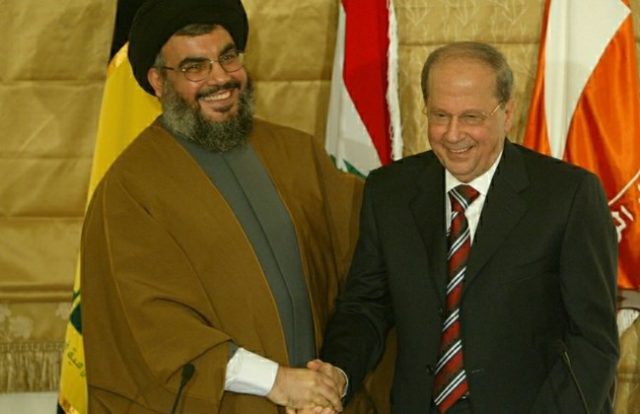
If war erupts again between Israel and Hezbollah in Lebanon, what pitfall should Israelis and the West avoid? A “naïve” view that the roles of the Lebanese government and its supporters counterbalance those of Hezbollah (“Party of God”) and its Iranian and Syrian backers. In fact, they’re complementary, says Maj. Gen. Giora Eiland (Ret.), former head of Israel’s National Security Council.
Eiland notes that Hezbollah leader Hassan Nasrallah’s “threats have become more frequent and more aggressive” in recent weeks. This might not be to minimize losses his movement has suffered in fighting for Syrian dictator Bashar al-Assad. Instead, Nasrallah’s bellicosity might reflect confidence gained from being on “the ‘winning side.’”
Parallel comments by Lebanese President Michel Aoun reiterate that Hezbollah is “part of the power protecting Lebanon from Israel.” Such claims are not new but strengthen “what should have been clear for years—that Hezbollah and the government” in Beirut “are one and the same,” according to Eiland.
Israel and the West have erred for years in seeing Lebanese politics as divided between two camps, the retired major general asserts. There are indeed two sides, the one many see as a pragmatic, moderate, largely Christian, Sunni Muslim and Druze camp reliant on Saudi, U.S. and French aid and a second, radical group “led by Hezbollah with the support of Syria and Iran.”
But a “naïve” “good guys versus bad guys” view misses the “unwritten agreement” between the camps, Eiland says. Each will use its advantage; ties with the West in the case of the Christian-Sunni-Druze group, the power as Lebanon’s main military force and decision-maker regarding war with Israel in the case of Hezbollah and its backers.
If a third Lebanese war (Israel versus Hezbollah in 2006, Israel against the Palestine Liberation Organization in 1982) breaks out, Eiland says “Israel should declare war on the state of Lebanon.” Hezbollah possesses an estimated 130,000 short- and medium-range Iranian and Syrian-supplied mortars, rockets and missiles (said to be more than any NATO country but the United States) embedded among Lebanon’s population and aimed at Israel.
So Eiland believes “it is only from a really short war [heavily damaging Lebanon’s infrastructure] that Israel will able to emerge victorious and without serious damage to its home front.”
If that is so, should the United States continuing providing more than $200 million annually to support Lebanese security forces? Looking not just at President Aoun’s pro-Hezbollah rhetoric but also reports of increasing cooperation between the Lebanese Army and Hezbollah, Elliott Abrams says yes—if Washington demands that any such trend “be halted and reversed.”
Abrams was deputy national security advisor in President George W. Bush’s administration and now works as a senior fellow for Middle Eastern Studies at the Council on Foreign Relations. He sees the army, integrated among Shi’ite, Sunni, Druze and Christian Lebanese as still worth maintaining—provided it keeps its distance from Hezbollah.

